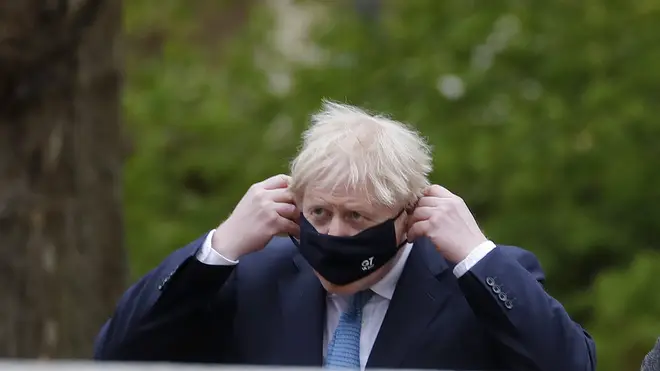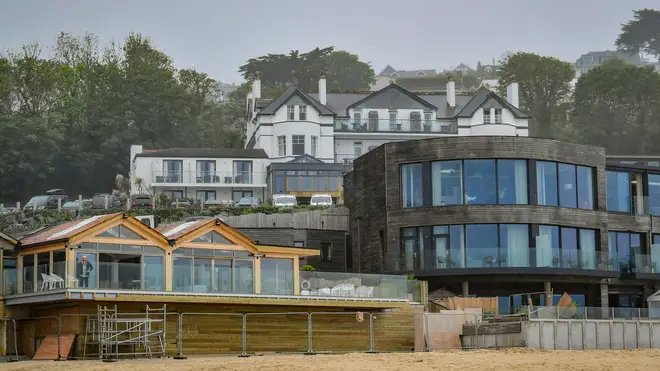
Paul Brand 3pm - 6pm
5 June 2021, 22:30

The Prime Minister will call on fellow leaders at the G7 in Cornwall to pledge to vaccinate the world's population against coronavirus by the end of 2022.
With the face-to-face gathering of leaders due to take place on Friday, Boris Johnson is planning to use the UK's G7 presidency to implore his counterparts to "rise to the greatest challenge of the post-war era" and put a stop to the pandemic by ensuring every person on the globe has access to a jab within the next 18 months.
"Next week the leaders of the world's greatest democracies will gather at an historic moment for our countries and for the planet," said Mr Johnson.
Read more: Second Covid-19 jabs ‘to be sped up for over 40s’
Read more: UK hits 40 million people vaccinated as Covid cases rise
"The world is looking to us to rise to the greatest challenge of the post-war era: defeating Covid and leading a global recovery driven by our shared values.
"Vaccinating the world by the end of next year would be the single greatest feat in medical history.

Portugal green travel list: Tory MP says it doesn't seem as if the government followed the science
"I'm calling on my fellow G7 leaders to join us to end to this terrible pandemic and pledge will we never allow the devastation wreaked by coronavirus to happen again."
The call comes after the UK Government has faced questions over its own dosage donations to Covax, the United Nations-backed scheme aiming to make vaccines available to low and middle income countries.
MPs and peers wrote to Mr Johnson last week urging him to follow the lead of the likes of Germany, France and Italy who have committed to donating at least 100 million doses of Covid-19 vaccines before the end of the year, while they said the UK had only so far vowed to donate surplus shots in future to Covax.
The Health Secretary told reporters on Friday that the UK would "absolutely" look to donate spare doses - following through on a Government pledge made in February - but that there were not any available currently.
"At the moment we don't have any excess doses, we're just getting them into arms as quickly as possible," Matt Hancock told reporters.

Downing Street argued that the UK had "led efforts to ensure the world's poorest and most vulnerable people have access to vaccines", referencing the part played by the Westminster Government in funding the Oxford/AstraZeneca jab.
With the jab made available at cost, No 10 said almost one in three shots administered around the world have been the Oxford vaccine, with 96% of the 80 million shots administered by Covax supplied by AstraZeneca.
Read more: G7 - Chancellor hails agreement to make big firms pay 'fair share' of tax
Officials also highlighted the "significant financial contribution" of £548 million given to Covax in its early formation.
G7 leaders will arrive in Cornwall's Carbis Bay on Friday for three days of meetings, with a focus on how the group, which includes the US and Germany, can lead the global recovery from coronavirus, officials said.
No 10 said the Prime Minister will tell them that to end the coronavirus pandemic for good, the world's biggest economies must go further and pledge to vaccinate the world by the end of next year.
He is set to make the case for stepping up the manufacture of vaccines, lowering barriers to the international distribution of those vaccines and sharing surplus doses with developing countries bilaterally and through Covax.
During those sessions the leaders, including those from Canada, Japan, France and Italy, will be joined virtually by experts, including the UK's chief scientific adviser Sir Patrick Vallance, philanthropist Melinda French Gates and environmentalist David Attenborough.
On Saturday, the G7 countries will be joined either in person or virtually by the leaders of Australia, South Africa, South Korea and India for discussions on health and climate change.
As well as asking leaders to boost efforts to vaccinate the world, the Prime Minister will ask for their support for the Global Pandemic Radar - a new global surveillance system which will protect immunisation programmes against new vaccine-resistant variants by detecting them before they have the chance to spread.